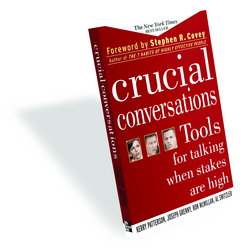As I write this blog, I am waiting in the Frankfort airport and traveling to Istanbul, Turkey to join the EO University and about 700 of my fellow entrepreneurs, including some of my very close friends. I have been looking forward to this conference for a while and have been intrigued with Istanbul for as long as I can remember. I suspect it has something to do with a movie I had seen when I was younger. I look forward to sharing some of my experiences from exploring the city and attending the conference in upcoming blogs.
 On the plane, I was reading “Crucial Conversations: Tools For Talking When Stakes Are High.” What makes this book so interesting is its implications for all areas of your life, even though it is a business book. It has really challenged me to think about why we tend to mess up conversations in important situations, like requesting a raise, discussing a big business deal, determining if your relationship will last, or trying to rekindle an estranged family relationship.
On the plane, I was reading “Crucial Conversations: Tools For Talking When Stakes Are High.” What makes this book so interesting is its implications for all areas of your life, even though it is a business book. It has really challenged me to think about why we tend to mess up conversations in important situations, like requesting a raise, discussing a big business deal, determining if your relationship will last, or trying to rekindle an estranged family relationship.
Why do we mess these up? In a crucial conversation, our natural fight or flight response kicks in, so blood leaves our brain and travels to the extremities in preparation for fight or flight. The blood leaving the brain decreases our cognitive ability to consider how to say the important things we want to say in a respectful and appropriate manner given the situation. In my experience, our words typically come out in the wrong tone or in a way that does not get the desired positive outcome.
The authors have researched thousands of crucial conversations, and they say having effective discussions is a learning process. When you understand what happens to your brain, you can combine this knowledge with some of their key findings and learn and grow in this area.
Their findings conclude people skilled at having productive conversations:
- Start from the heart. This means they start with the right motives. Winning is usually not the right motive. We are brought up to want to move forward and get ahead. When this is brought into the crucial conversation, it leads to bad outcomes.
- Focus on what they really want. When you are starting to move toward a position of silence, defensiveness, or punishing the other, ask yourself, “What do I want for myself, for others, and for the relationship?” By clarifying what you do and do not want, you free your brain to start searching for better and healthier options.
I know I need to work on this, so I’ll focus on it until I grow my awareness and really improve. How about you? Are your crucial conversations productive and healthy?

